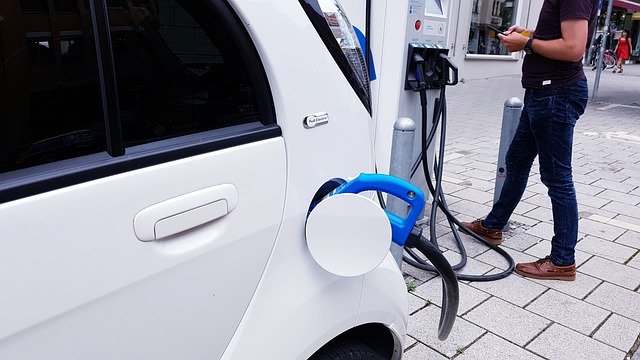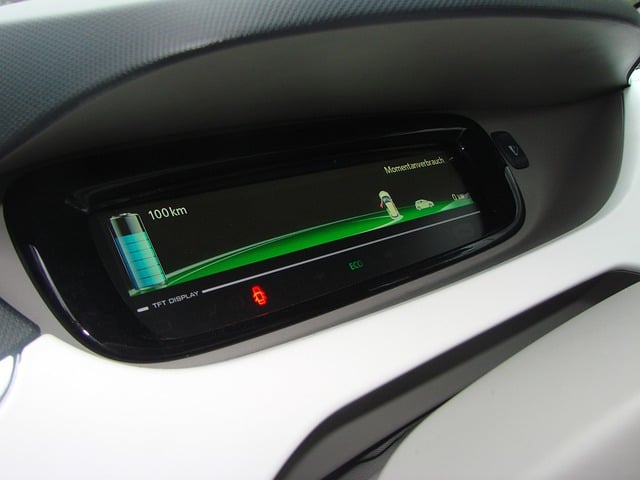Introduction – Electric Car Horsepower
Electric vehicle (EV) horsepower is almost the same as traditional car though not as high as internal combustion engine (ICE) cars, but it is still powerful enough to provide a comfortable and safe ride. Electric cars also have the advantage of being able to generate high torque from a cold start, which makes them much more responsive than traditional cars. An internal combustion starts off with very low horsepower and torque, which builds up as the engine speeds up.

Power output from an electric motor can be increased by using a higher voltage battery pack. However, this will also result in a decrease in range. When choosing an electric car, it is essential to find a balance between power and capacity.
EV Vs ICE Deliver Power Differently
One of the biggest differences between EVs and ICE vehicles is the way they deliver power. Electric motors provide instant torque, meaning they can provide all their power immediately, resulting in quick acceleration. ICE vehicles, on the other hand, need to rev up to reach their maximum power. This characteristic often makes EVs feel faster and more responsive, even if their “horsepower” as listed on a specification sheet is similar to an ICE vehicle.
EVs Fall On Either Side Of ICE Horsepower
The horsepower ratings of EVs can be similar to, lower than, or higher than those of ICE vehicles, depending on the specific models being compared. For example, the Tesla Model S Plaid produces over 1000 horsepower (see our table below), which is far more than most ICE vehicles. However, a small, economical EV might have a lower horsepower rating compared to a high-performance sports car with an ICE. Remember that due to the immediate torque of electric motors as we mention above, an EV with similar horsepower to an ICE vehicle may feel more powerful.
EV Efficiency Is Better Than ICE
In terms of converting energy into motion, electric motors are much more efficient than internal combustion engines. ICEs lose a lot of energy to heat and mechanical inefficiencies, while electric motors can convert a larger proportion of the electrical energy into kinetic energy. It’s related to the fact that an EV has the “instant torque” effect – because of the direct coupling of the axle to the motor.
Horsepower for the Best Selling Electric Cars – Top 10
Here we compiled the maximum horsepower offered for the top ten selling models of electric vehicles. Models which offer options to customers may have a range of horsepower. For example an all wheel drive option for the ID.4 boost the horsepower from 145 hp to 295 hp. In each case we listed the maximum hp available even though that might not be the most popular option due to the added cost.
| Manufacturer | Model | Max Horsepower |
| Tesla | Model Y | 450 hp |
| Tesla | Model 3 | 480 hp |
| Ford | Mustang Mach-E | 480 hp |
| Chevrolet | Bolt | 200 hp |
| Volkswagen | ID.4 (dual motor AWD) | 295 hp |
| Nissan | Leaf | 214 hp |
| Audi | e-Tron | 355 hp |
| Porsche | Taycan (Turbo S) | 750 hp |
| Tesla | Model S (Plaid) | 1020 hp |
| Hyundai | Kona Electric | 201 hp |
What Is Horsepower? How Does It Work For Electric Cars?
A horsepower is a measurement unit typically used to describe the power output of engines and motors. It is often abbreviated as “hp.” One horsepower is equal to approximately 746 watts.
The term “horsepower” was first coined by James Watt, a Scottish engineer who invented the steam engine. He chose the term because he felt that it accurately described the power of his engine concerning that of a horse.
Today, the term is still commonly used to describe the power output of internal combustion engines and electric motors. However, you should note that different types of engines and motors can produce different levels of power for a given horsepower rating. For example, an electric motor might produce more torque than a gasoline engine with the same horsepower rating.
In general, though, the higher the horsepower rating, the more influential the engine or motor will be. This makes sense, as a higher horsepower rating means you can do more work quickly.
For electric cars, horsepower is an important metric to consider when determining how much power the car will have. A higher horsepower rating usually means that the car can accelerate faster and have more torque available for climbing hills or passing other vehicles on the road.
Of course, other factors affect an electric car’s performance besides its horsepower rating. However, horsepower is still important when shopping for an electric car.
How To Calculate Electric Car Horsepower?
When it comes to electric vehicles (EVs), one of the key performance metrics is horsepower. How much power an EV has can be a significant deciding factor for many consumers. So, how do you calculate horsepower in an EV?
There are a few different ways to do it, but the most common method is to use a formula that considers the motor’s torque and rpm. The formula looks like this:
horsepower = torque x rpm / 5252
The first thing you need to do is determine the motor’s torque. You can do this by measuring the force required to turn the motor at a specific speed. Once you have the torque, simply plug it into the above formula along with the rpm of the motor. For example, if an EV has a motor with a torque of 200 Nm and an rpm of 3000, its horsepower would be:
horsepower = 200 x 3000 / 5252 = 115 hp
So there you have it! That’s how you calculate horsepower in an EV. Using this simple formula gives you a good idea of how much power an electric vehicle has.
Internal Combustion Engines Start With Low Power Whereas Electric Engines Are Instant On
Internal combustion engines cannot get to max horsepower immediately because they require an appropriate amount of time to build up RPM. As the RPM increases, more air and fuel can be added to the combustion chamber, which allows the engine to produce more power. Additionally, the engine components need to heat up to the optimal operating temperature before they can reach maximum horsepower. This process can take several seconds to a few minutes, depending on the engine size and the load placed on it.
Electric car engines are different from traditional internal combustion engines in that they do not require a combustion process to generate power. Instead, electric motors generate power by using magnets and an electrical current to produce rotational force. Electric car engines are able to reach peak power almost immediately because they do not need to wait for the engine components to heat up or for RPM to build. Additionally, electric car engines do not require the use of fuel, making them more efficient and environmentally friendly.
The difference in horsepower between electric and internal combustion engines is due to the way they generate power. Internal combustion engines require an ignition process to combust fuel, which generates power. This process takes time and requires the engine components to heat up before reaching peak power. Electric cars, on the other hand, generate power more quickly and efficiently through the use of magnets and electricity, allowing them to reach peak power almost immediately.
How Do EVs Deliver Instant Power?
Electric vehicles (EVs) have become increasingly popular in recent years, and it’s not hard to see why. They’re environmentally friendly, they’re efficient, and they’re fun to drive. But one of the best things about EVs is their instant power. How do they do it?
First, let’s look at how a traditional gasoline-powered car works. When you step on the gas pedal, you’re opening a valve that allows fuel to flow into the engine. The engine ignites the fuel, creating a small explosion that drives the pistons up and down. This up-and-down motion is what turns the wheels and propels the car forward.
In an EV, there is no need for fuel or explosions. Instead, EVs use an electric motor to generate power. When you step on the accelerator, electricity flows from the battery to the motor. The motor then uses this electricity to spin a set of magnets around a set of coils. This spinning motion creates a magnetic field that drives the wheels and propels the car forward.
So, what’s the advantage of this electric motor over a gasoline engine? Well, for one thing, it’s much simpler. There are no valves, pistons, or explosions—just a motor spinning some magnets around some coils. This simply means that EVs can deliver power more efficiently than gasoline cars. And because no explosions are involved, EVs are much quieter than gasoline cars.

But the biggest advantage of an EV over a gasoline car is that it can deliver power instantaneously. As soon as you step on the accelerator, electricity starts flowing to the motor, and the car starts moving forward. With a gasoline car, there’s always a slight delay between when you step on the gas pedal and when the car starts moving—but not with an EV!
So there you have it: How EVs deliver instant power! If you’re looking for a fun and environmentally friendly car, an EV is worth considering.
Is 170 Horsepower Good For EVs?
No. 170 horsepower is on the low end for an electric vehicle. The low-end models by Nissan and Hyundai all exceed 200 hp. Only the VW ID.4 non AWD option outputs a measly 145 hp. So the answer to whether 170 hp is good for an electric vehicle is that it’s pretty low. But you really should be looking at the car in total not just the hp. If the car frame were very light, then even low hp means good acceleration and handling and climbing. Ultimately car performance isn’t going to come down to a single number.
Wrapping Up
In conclusion, electric cars have horsepower just like any other car. The amount of horsepower an EV has depends on the size and power of its electric motor. EVs can have anywhere from 50 to over 1000 horsepower. The average EV has about 400 horsepower. EVs deliver power instantaneously, thanks to their electric motors. Gasoline cars are delayed between when you step on the gas pedal and when the car starts moving, but not EVs!
You can also read:
Off-Grid Power Systems For Homes: An Overview
The Best Heating Suit To Keep You Warm: Top 5
Going Off Grid With Solar Panels: An Overview
How Do Solar Companies Make Money?
